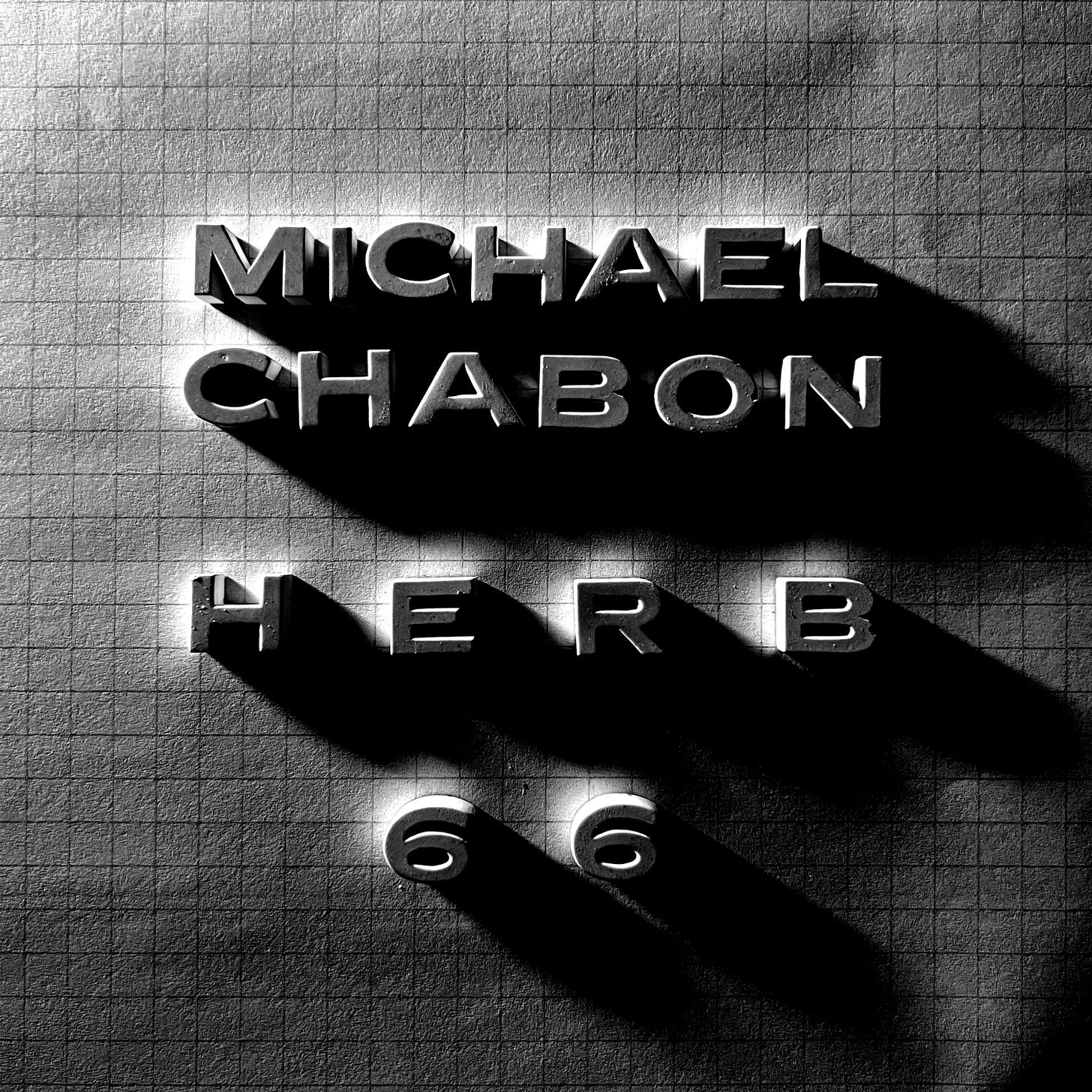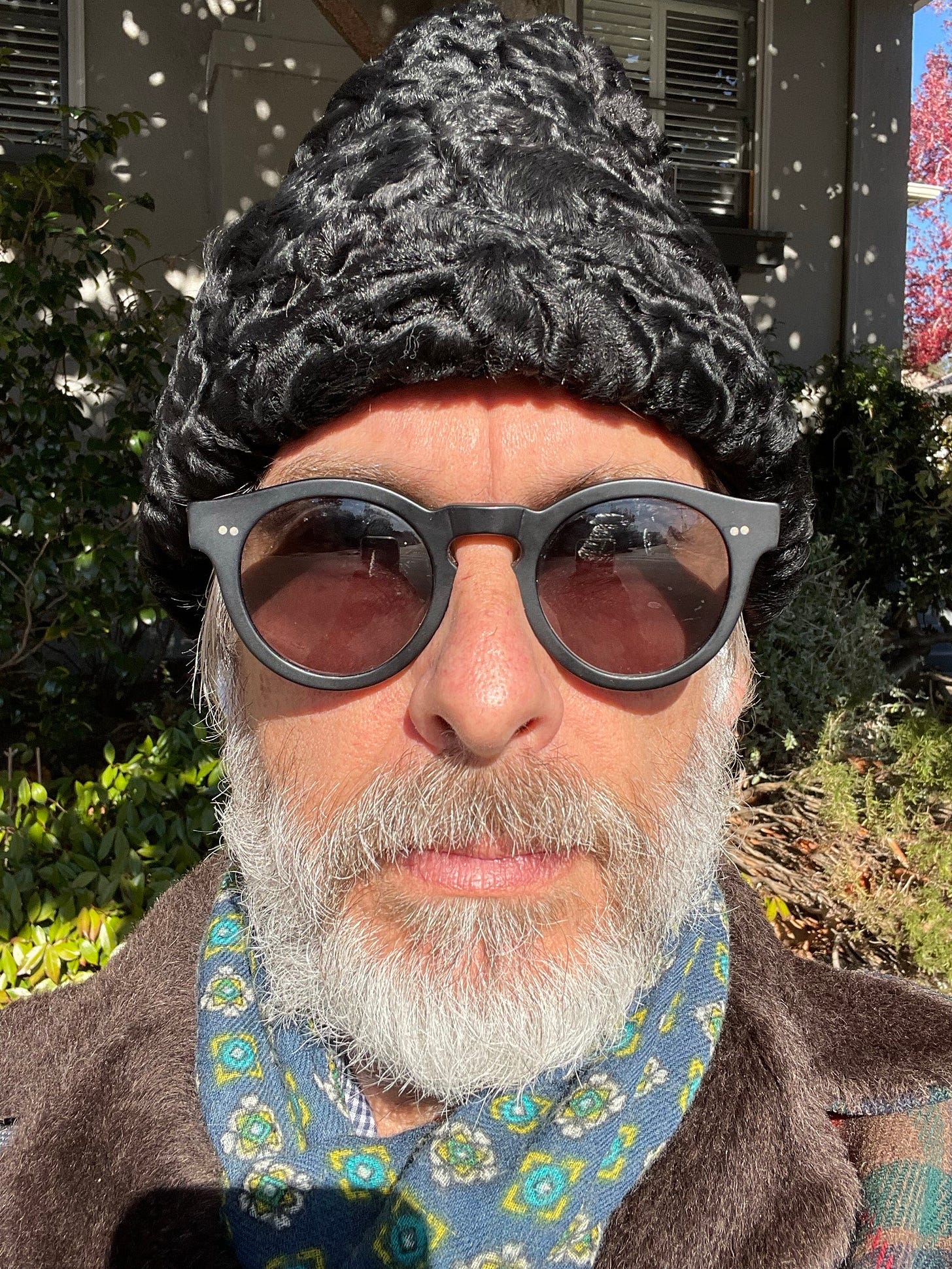Herb Sundays 66: Michael Chabon [Season 5 premiere]
The Pulitzer Prize winning writer shares a "thematic playlist" for his current book-in-progress, a novel set in the American Southwest.
Herb Sundays 66: Michael Chabon (Apple, Spotify, Tidal). Art by Cina.
“This playlist grows out of the music I’ve been listening to while working on my current project, a novel set in the American Southwest. I tend to listen almost exclusively to instrumental music while I’m writing, because sung lyrics interfere with my own flow of words. While working I’ll mostly just let entire albums unspool, but I do also craft “thematic” playlists for particular projects, and one for this latest book, which might be called Highways of Cimmeria, was overdue. I’m grateful for your giving me the push I needed to edit down all the music I’ve been digging while writing the book into a playlist that I think could work very well for all different kinds of Sundays, regardless of what’s on tap for the day. Its vibe plays at the intersection of instrumental country/folk/ambient/neoclassical, some pieces more modern, some more traditional.”
Michael Chabon is a writer who lives and works in Berkeley, California. His most recent novel is Moonglow. He is currently working on a book, which is where we find him at the time of this playlist. Chabon has published 8 novels including The Amazing Adventures of Kavalier & Clay (2000) which won the Pulitzer Prize for Fiction.
Because I knew he was a comic book/pop culture guy from Kavalier & Clay, I’ve always felt an ambient kinship with Chabon, which was renewed when I found out he was a Ghostly fan in recent years. Chabon’s interest in music and culture is clear in his work and online presence, and I only recently found out he was a screenwriter on (Michigan’s own) Sam Raimi’s Spider-Man 2 (2004) (check out his original script) and 2012’s John Carter, a commercial flop which pained him as a major fan of the source material. He has written lyrics for and with folks like Moses Sumney and the late Adam Schlesinger, another builder of fictional humanistic worlds.
I clocked his Instagram and knew he was harboring playlists, and this one really excels. It's got that hopeful bittersweet thing going for it, with a vast optimism in spite of it all. I guess that’s how writers have to live, they know it always goes to shit, but that’s ok.
The playlist also confirms a suspicion of mine, that (some) writers make a soundtrack for books they are working on. I’d assume these are used as a leitmotif of sound, pushing the plot through. A quote that stayed with me was from a Q&A with the director, Tomas Alfredson (Let the Right One In (2008), etc.) at a conference a decade ago. He claimed that he always has one song that sort of guides his work on a film. He said he doesn’t reveal what that song is it to anyone. I sort of dug that too.
I am not a Chabon scholar, nor a true student of any writer in full, but have run into his work over the years, including seeing Wonder Boys (2000) in the theatre, and reading Kavalier (did I finish it back then?). He’s one of those writers that whenever you dive in again, it’s just like “oh yeah” and you file him back to the front of the stack of impossibly good.
It would have been herb-y of me to have tried to whiz through a book in full, or sample all of his wares, but I’m a selfish reader who uses books like music, or to augment my current moods or needs, so I locked in on his 2009 collection of essays Manhood for Amateurs: The Pleasures and Regrets of a Husband, Father, and Son.
As a parent of a 19-month-old, I was expecting to be reading more parenting books by now but have found the topic difficult to wade in. I think discussing parenting is sort of what they say about telling people about your dreams: The words all mean something but they are still too wildly personal to connect on fully. The other thing about reading/writing about parenthood is that there’s an inherent goal for a spiritually luminous or virtuous quality that the space wants to impart, but its hard to get at some of the truths without being a bummer.
From what I could tell, Chabon seems like an archetypal Cool Dad. He’s a child of the 70’s with the memories of a wild and free time who can talk honestly about sexdrugsrockandroll in a way that is honest and open, but also can still relate to the terror of being a kid. I sort of hope to have that benevolent coolness one day, but alas I wasn’t coming of age in the 70’s. However, I hit a passage of his that I could get behind:
A father is a man who fails every day. Sometimes things work out: Your flashed message is received and read, your song is rerecorded by another band and goes straight to No. 1… success, however, does nothing to diminish the knowledge that failure stalks everything you do. But you always knew that. Nobody gets past the age of ten without that knowledge. Welcome to the club.
OK bingo, let’s go.
What few told me about parenting was the fear of the whole thing, especially in its expectation. That the level of doubt and (shamefully) ego that precedes it (will they inherit my many flaws?) is an icy sheen on dark nights. One of the best pieces of advice I got was something no one had told me, which was “give yourself a second to deeply love your child.” This tiny morsel, which isn’t going to appear on any greeting cards, really helped me prepare. Not that I didn’t cry and swoon upon his arrival, but because to actually feel it all, to really get it, it would take a moment to sink in and to know my kid and love him for who he was. This saved me enormously.
I also realize this is moment of doubt is minuscule compared to what mothers endure, and that an endless stream of spoken and written narrative seem to follow their every move. Chabon clocks this in a short story about a lady who fawningly calls him a “good dad” at a supermarket checkout and his realization that the bar isn’t that high in the eyes of the world. Its a feeling I’ve felt before.
This is partly because mothers are attuned, in a way that most fathers have a hard time managing, to the specter of calamity that haunts their children. Fathers are popularly supposed to serve as protectors of their children, but in fact, men lack the capacity for identifying danger except in the most narrow spectrum of the band.
I really like his essays and short stories, they are like good songs, re-readable little pools of thought that have enough width to ripple, but not consume. It’s about as much thought or feeling as one can hold in one sitting. The coffee cup line is right at the brim.
Kind of like these tunes! The moody passage from Daniel Lanois and Rocco DeLuca, The aching of Chuck Johnson (who is like a musical Chabon to me, whenever I hear him… “oh yeah”), The psych western of William Tyler, the plaintive early Kevin Morby, and recent work by Marisa Anderson. I’ve always had a penchant for what I now understand to be ‘American Primitive’ guitar style. I like that acoustic guitars are percussive instruments. There’s adjacency found here to ambient (Eno shows up to the party with a blue beverage), Kranky post-rock (The Dead Texan brings brownies), and Midwestern Space Rock (I will assail Mr. Chabon with a playlist after this posting). Space movies and Westerns share the common loneliness and heavy stillness.
Most importantly, Chabon is a fan of art and making stuff and what comes out of that making (“My story and my stories are all, in one way or another, the same, tales of solitude and the grand pursuit of connection, of success and the inevitability of defeat.”) and that is all you need to know.
Every work of art is one half of a secret handshake, a challenge that seeks the password, a heliograph flashed from a tower window, an act of hopeless optimism in the service of bottomless longing. Every great record or novel or comic book convenes the first meeting of a fan club whose membership stands forever at one but which maintains chapters in every city—in every cranium—in the world. Art, like fandom, asserts the possibility of fellowship in a world built entirely from the materials of solitude. The novelist, the cartoonist, the songwriter, knows that the gesture is doomed from the beginning but makes it anyway, flashes his or her bit of mirror, not on the chance that the signal will be seen or understood but as if such a chance existed.
FROM THE FIELD:
I wrote about the state of canon (link to original piece) for Dirt, a publication that I really like and encourage you to support. They publish great stuff by writers of all stripes 5 days a week. Special thanks to Daisy and Jocelyn at Dirt and to W. David Marx (Herb 53) whose Status and Culture book helped me get a grip.
I’m going to dig in on canon-making here and there this year, but a going thesis is published here on Substack. This is a work in progress and I’m happy to be updated, refuted or corrected. Please engage me on the bird app and we will learn together.
BONUS NUGG FROM CHABON:
“I’m bummed to have to leave out a great, atmospheric track “Spiritual,” by Tom Verlaine and the Kronos Quartet, which appears to be unavailable on Spotify or Apple!” - M. Chabon
RIP Tom Verlaine (December 13, 1949 – January 28, 2023):
From Chabon’s Instagram: “I was about the same age when I first heard this record [Marquee Moon (1977)] as Verlaine when he wrote “Venus,” and though I might not then (or now) have been able to say for certain what exactly he meant by ‘the world was so thin/between my bones and skin’, I was (and remain) absolutely certain that they described exactly how it felt to *be* that age, abroad in the big world, endlessly ready to fall into the elusive illusive arms of Venus de Milo.”








I just finished reading Chabon’s moving homage to his grandfather’s trade, linotype machine typesetter, a craft which I, like he, plied through decades, though throughout lobster shifts in the bowels of Manhattan. His grandfather, as I, Michael has made whole.